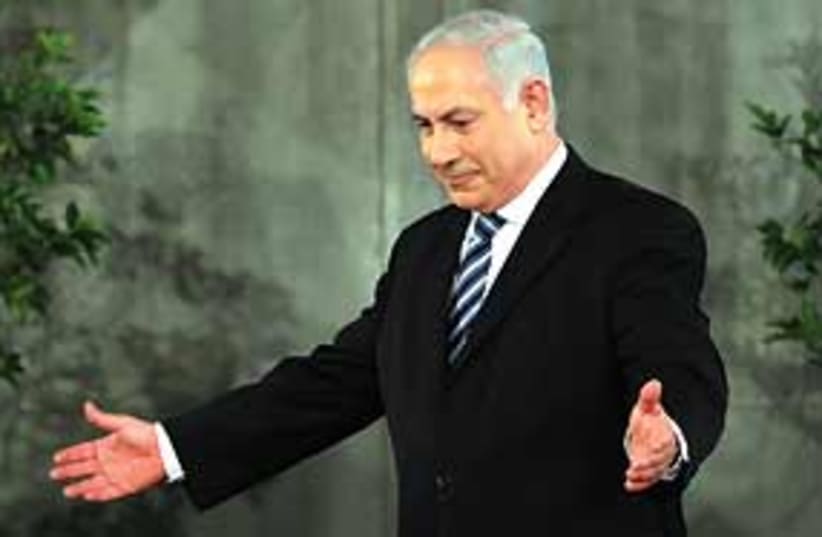In his first public statement regarding the controversysurrounding Israel Beiteinu’s proposed conversion bill, Prime Minister BinyaminNetanyahu on Wednesday assured the heads of the Masorti (conservative) andReform movements in Israel in a written communiqué that “any legislativearrangement [on conversion] will have to ensure the unity of the entire Jewishpeople.”
The letter, penned by Cabinet Secretary Zvi Hauser, comes as Jewish AgencyChairman Natan Sharansky prepares to meet with conservative and reform leadersin the ,as per Netanyahu’s request of him to lead a dialogue with Diaspora Jewry on thevolatile bill.The leaders of the Masorti and Reform movements had expressed their concernsover the bill, sponsored by MK David Rotem, time and again to the primeminister. In a letter to Netanyahu from March, the Masorti movement maintainedthat “the additions the Justice Ministry requests to add to the law...contradict High Court rulings on conversions” and create a slew of problems fornon-Orthodox converts, who are not recognized by the Chief Rabbinate - whichwould become the sole conversion authority in Israel.“The prime minister takes the points you raised in your letter[s] veryseriously,” Hauser’s letter from Wednesday reads, “and has ordered that thelegislative arrangements would be undertaken attentively and sensitively, inorder to bridge over the different stances.”Yizhar Hess, executive-director of the Masorti Movement in Israel said that “We are happy the prime minister chose to send a calming and conciliatory message, we’ve been waiting for one. Rotem’s proposal threatened to divide the Jewish people, and following the prime minister’s guidelines, we hope that coalition member Rotem will immediately shelve the proposed bill in its current format.”Orthodoxy is a minority in the Jewish peoplehood,” Hess continued. “Most of the Jewish people are reform and conservative. The Jewish state cannot exclude and alienate the Jewish people. Or there will be no Jewish state.”Rotem’s conversion bill was conceived by Israel Beiteinu to alleviate the situation of hundreds of thousands of Israeli citizens, primarily from the former Soviet Union, who are not Jewish according to halacha and face unyielding stringency if and when they seek to undergo a conversion. Rotem’s draft was met with resistance from Shas, who initially supported it but following the lead of United Torah Judaism, insisted on clauses that among other changes, ruled out the option for recognizing non-Orthodox conversions and might alter the terms of the Law of Return.The concerns raised by Jewish groups in the United States, and the appeal of the Jewish Federations of North America “to enter into dialogue with Diaspora Jews before making any proposed changes to the Law of Return” prompted Rotem and Deputy Foreign Minister to meet with religious and lay leaders there in the end of April, to convince them the bill would have no impact on their status or the rights of US converts to immigrate to Israel.However, the Jewish Federations of North America sent a letter to Netanyahu following the meetings signed by the heads of the conservative, reform and reconstructionist movements, in which they urged him to oppose “this dangerous bill” that would be “disastrous to the unity of the Jewish people.”As part of his efforts to maintain that unity, Netanyahu recently requested that Sharansky lead dialogue on the topic with the non-Orthodox streams of Judaism. Sharansky, who is currently in the US, will be meeting with reform and conservative leaders in New York on Tuesday. Ahead of his departure, he held consultations with the movements’ local representatives.
Sharansky has also been successful in ensuring that “the JewishAgency’s position on [the conversion bill] and any future legislationwill be taken into account during discussions with the Prime Ministerand before any final decisions are made,” as he told members of theagency’s board in a letter from April.“Furthermore,” the letter continues, “no official action will be takentill after the Board of Governors in June, when representatives fromall streams of Judaism from the Committee for the Unity of the JewishPeople, will have the opportunity to weigh and discuss these pivotalquestions with the representatives of the government.”Rotem told The Jerusalem Post on Thursday that hewas not aware of Netanyahu’s recent letter to the Masorti and Reform leaders,which “has nothing to do with me.” He was not concerned that his billmight be undermined by Netanyahu’s actions, and stressed that “what theprime minister is doing [in enhancing dialogue with US Jewry] is veryimportant.”Ayalon will also be in the US next week, where he will be meeting againwith Jewish religious leaders over his party’s proposed conversion bill.